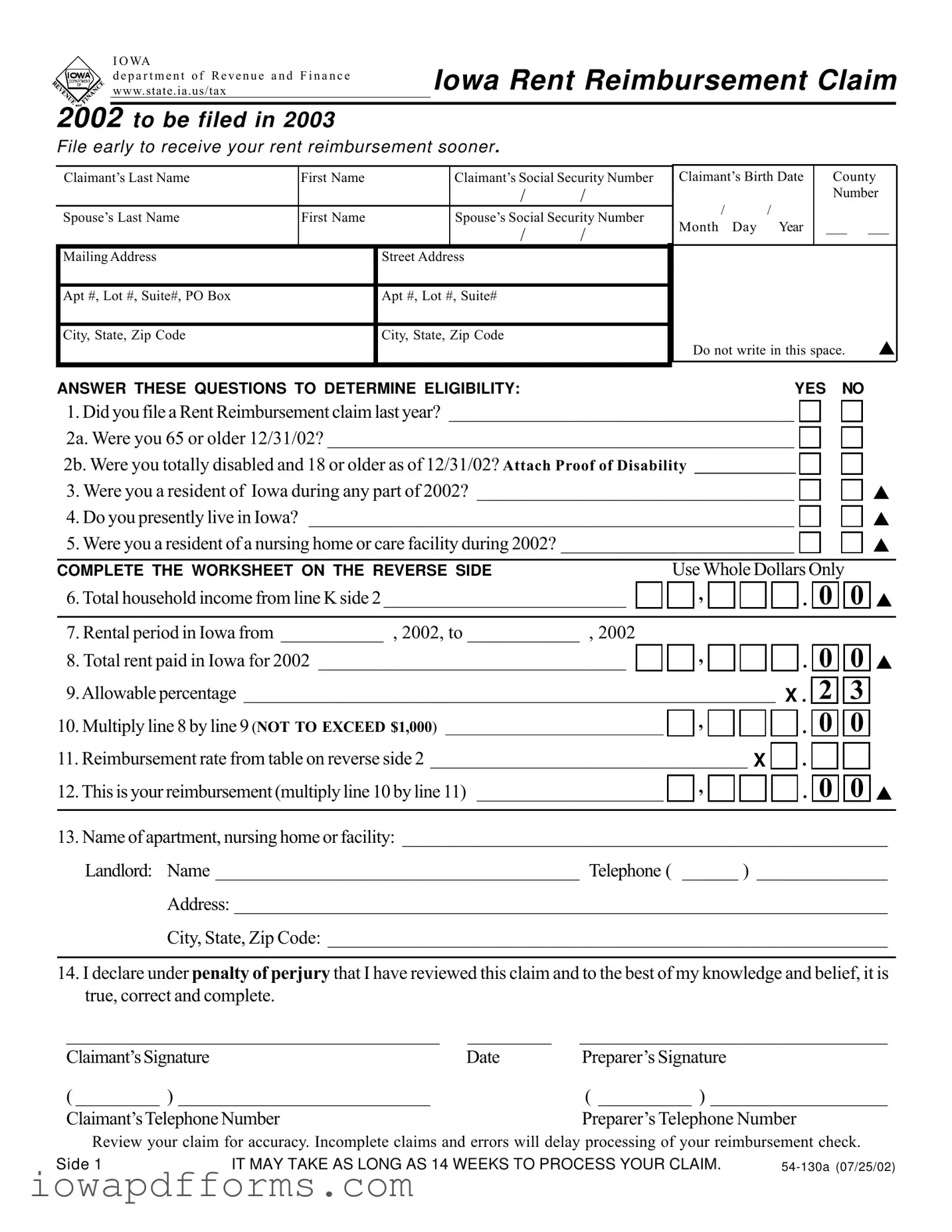The Iowa 54 130A form is similar to the IRS Form 1040, which is the standard individual income tax return form. Both documents require personal information, including Social Security numbers and income details. They serve the purpose of assessing eligibility for financial benefits, with the 1040 focusing on tax liabilities while the Iowa form targets rent reimbursement. Each form necessitates accurate reporting of income and residency status, ensuring that the claims made are valid and verifiable.
Another comparable document is the Iowa 54-130B form, which is the worksheet for calculating total household income. This form is used in conjunction with the 54 130A, as it provides a breakdown of income sources that contribute to the overall household income. Both forms require similar financial disclosures and help determine eligibility for benefits. The 54-130B allows for detailed reporting of various income types, just as the 54 130A uses this information to calculate potential rent reimbursement.
The Application for Rental Assistance (ARA) is also similar to the Iowa 54 130A form. Like the 54 130A, the ARA collects personal and financial information to determine eligibility for rental assistance programs. Both forms require applicants to provide proof of income and residency, ensuring that assistance is directed to those who meet specific criteria. The ARA is aimed at helping individuals and families facing housing instability, paralleling the rent reimbursement focus of the Iowa form.
The HUD Form 50058, which is used for reporting information about families applying for housing assistance, shares similarities with the Iowa 54 130A form. Both documents require personal information and details about household income. The HUD form focuses on eligibility for public housing programs, while the Iowa form is specifically for rent reimbursement. Each form emphasizes the importance of accurate income reporting to assess eligibility for financial support.
The SSI (Supplemental Security Income) application form also bears resemblance to the Iowa 54 130A form. Both forms are designed to determine eligibility for financial assistance based on income and residency. The SSI application requires detailed information about income sources and living arrangements, similar to the requirements of the Iowa rent reimbursement claim. Both forms aim to assist low-income individuals in receiving necessary financial support.
The Section 8 Housing Choice Voucher application is another document similar to the Iowa 54 130A form. This application collects personal and financial information to determine eligibility for housing assistance. Like the Iowa form, it requires proof of income and residency. Both forms are essential for individuals seeking assistance in affording housing, emphasizing the need for accurate reporting of financial circumstances.
When dealing with the complexities of all-terrain vehicle ownership, it is crucial to utilize the appropriate documentation, such as the Top Forms Online, to facilitate a clear and legally binding transfer of ownership. Ensuring that both vendor and purchaser are aligned on the details helps to mitigate any potential disputes and guarantees proper registration during the sales process.
The Low-Income Home Energy Assistance Program (LIHEAP) application shares characteristics with the Iowa 54 130A form. Both documents collect information about household income and residency to assess eligibility for financial aid. While the LIHEAP application focuses on energy assistance, it parallels the Iowa form's goal of providing financial support to low-income households. Each form requires detailed reporting to ensure that assistance is appropriately allocated.
Lastly, the Medicaid application form is similar to the Iowa 54 130A form in that both require personal and financial information to determine eligibility for assistance programs. Medicaid focuses on health care coverage for low-income individuals, while the Iowa form addresses rent reimbursement. Both forms emphasize the importance of accurate income reporting and residency status to ensure that applicants receive the benefits they qualify for.



